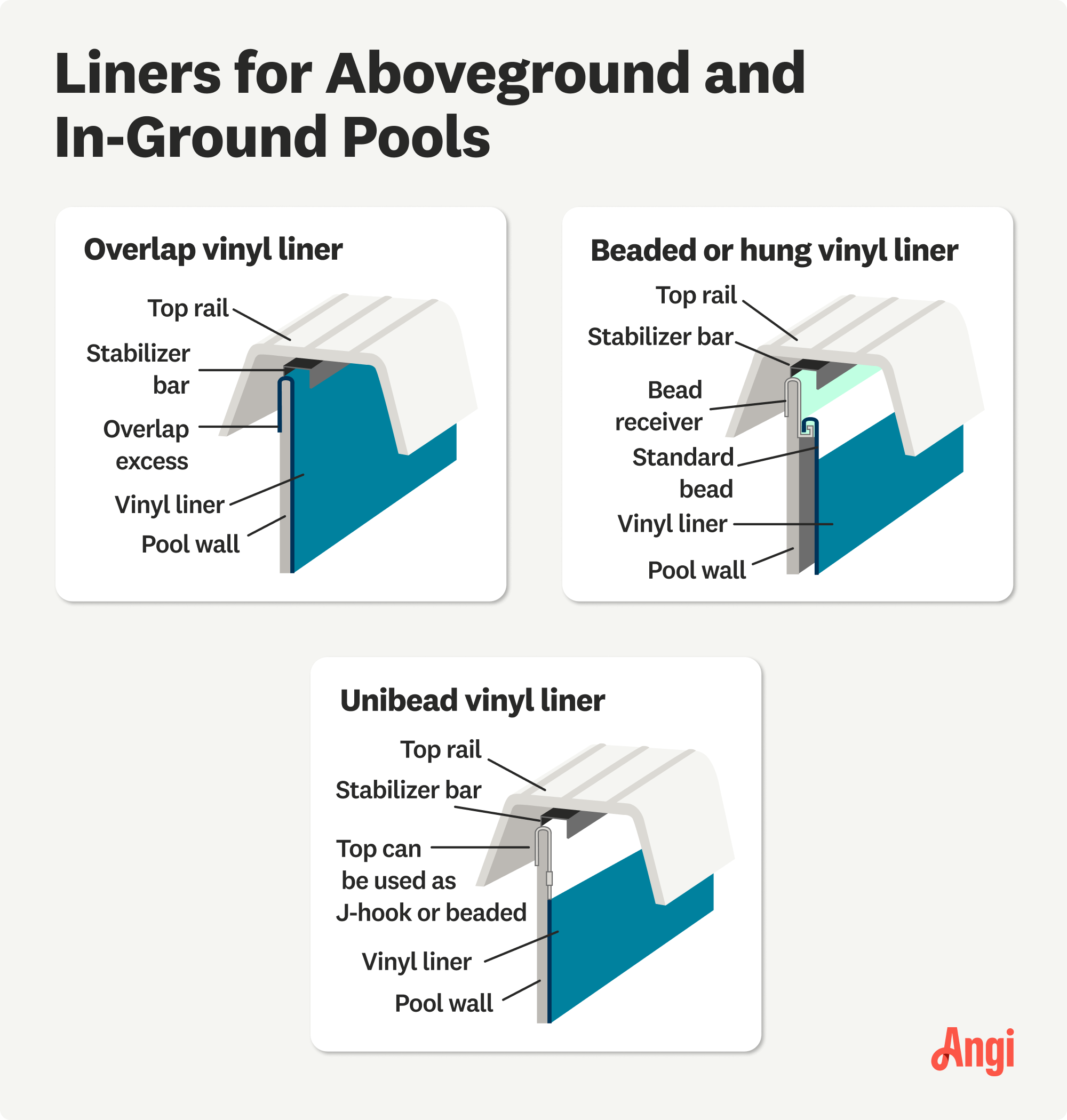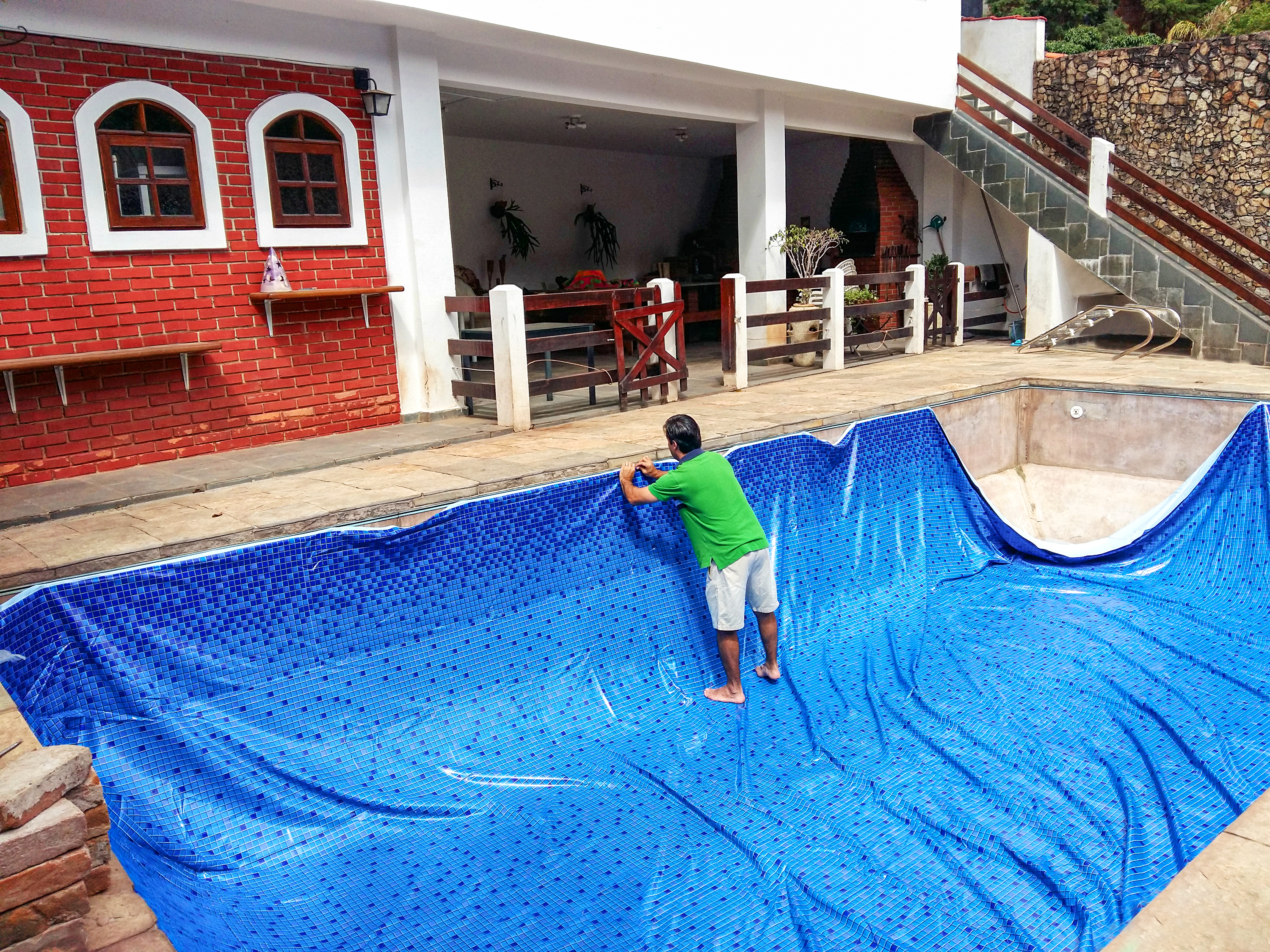
How much does a pool cost per month in electricity? Pools use more energy than most home appliances, but you can invest in energy-efficient equipment to reduce costs.
Pool liner replacement costs an average of $2,669 in Detroit, with a range of $1,300 to $3,750. A pool liner installer can assess your pool size, shape, and liner type and create a quote.


The best time to replace your pool liner in Detroit is between May and September.
Getting your liner replaced regularly is key to preserving your pool’s value.
Your best bet is to hire a pro to take on this labor-intensive project so it’s done correctly.
Pool liner replacement costs in Detroit are right around the national numbers, with costs ranging between $1,300 and $3,750 and averaging $2,669. Your pool size, material, and liner type are the biggest factors affecting your budget. It’s essential to keep up with regular liner replacements in Detroit so your pool is in good condition and you won’t miss out on the shorter swim season.
Estimate the costs for your pool liner replacement by considering the biggest cost factors.
The size of your pool is one of the most influential cost factors when estimating your liner replacement. Replacing smaller pool liners requires less labor, materials, and time, whereas bigger pools require a larger team, more materials, and several days to complete the project.
| Pool Size (Feet) | Average Cost to Replace Liner |
|---|---|
| 6x8 | $240 |
| 8x12 | $480 |
| 8x20 | $800 |
| 10x8 | $400 |
| 12x20 | $1,200 |
| 16x32 | $2,560 |
| 18x36 | $3,240 |
| 20x40 | $4,000 |
The pool liner material you’re replacing plays a big factor in the total costs. The most common liner replacements are for vinyl pools, which need to be replaced every 10 years.
| Pool Liner Material | Average Replacement Cost | Pros | Cons |
|---|---|---|---|
| Vinyl | $300–$4,000 | Lower cost | Needs regular replacement |
| Various options for shape, size, and print | High lifetime cost | ||
| Fiberglass | $1,000–$8,000 | Durable and long-lasting | Limited in size and shape |
| Built-in features like bench seats | More costly than vinyl | ||
| Tile | $2,000–$70,000 | Visually pleasing | Complex installation |
| Many design options | Higher up-front cost |

The pool liner type you choose is another determining factor. The most common options for aboveground pools are overlap and uni-bead liners. Overlap liners are draped over the pool and clamped down, while uni-bead liners have a J-hook to hook over the edge of the pool wall. You also have the option of trimming the hook portion and using it as a beaded liner.
Beaded liners are commonly used on in-ground pools, which attach to a track on the pool wall. This setup makes it easier to remove old liners and install new ones.
| Liner Type | Average Cost |
|---|---|
| Overlap | $200–$600 |
| Uni-bead | $400–$900 |
| Beaded | $500–$1,000 |
Vinyl pool liners are available in different thicknesses. The standard thickness is 20 mil because it’s durable enough to withstand normal wear and tear while being malleable enough to fit in the nooks and crevices in your pool.
There are thicker options, like 28, 30, and 40 mil thick, that cost $300 to $500 more. Because of the freeze-thaw cycles during the winter, an optional pool liner thickness is 27 or 28 mil in Detroit. These are thick enough to stand up to punctures, contraction, and expansion. These long-lasting liners are also stronger than thinner options, which helps prevent cracks and stretching.
Consult with a pro before choosing a thick pool liner. If you choose the wrong size, it’s possible it won’t conform as well to your pool size. This can cause wrinkling down the road, potentially leading to accidental damage and water leaks.

These additional pro costs will affect your project’s budget, like labor, seasonal considerations, and more.
Labor costs range between $250 and $800 for replacing liners on aboveground pools, while liner projects on in-ground pools cost $1,000 to $2,500. The costs vary with the company you hire and your pool size and shape.
You might be toying with the idea of taking on a DIY pool liner installation, but it’s a big job, and mistakes can be costly. Your best bet is to hire a pool liner installer in Detroit, Michigan. A pro can evaluate your project, make small repairs to your pool as necessary before installing the new liner, and complete everything to a high standard.
Pool liner replacement requires dry weather with temperatures between 70 and 85 degrees Fahrenheit. This means the ideal time to get the job done in Detroit is May through September. To get the best rates, plan the installation as early as possible. Assuming your liner isn’t showing signs of leaks or damage, getting on the schedule during the off-season gives you the potential for discounted rates.
On the flip side, a water leak can necessitate an emergency replacement. If it’s the peak of pool season, there could be a delay before a pro is able to come do the installation. In these instances, a temporary repair can help hold you over.
Detroit doesn’t require a permit for pool liner installations. However, if your liner installer notices your pool needs repairs, you may need building, mechanical, electrical, or plumbing permits depending on the work you need to get done.
Remember to factor in the 6% sales tax when estimating your pool liner replacement costs.
Replacing your pool liner is an integral part of your maintenance schedule. While the installation doesn’t add value to your home directly, it can help preserve the value the home derives from the pool.
In Detroit, home values don’t increase much with an in-ground pool installation, which is common in areas where the pool season only lasts four to five months. Because pool use is limited for a short period during the year, prospective buyers may view pools as a liability rather than a plus. For this reason, keeping your pool in tip-top shape is essential so buyers aren’t deterred by the possibility of costly pool repairs or renovations.
Home is the most important place on earth, which is why Angi has helped more than 150 million homeowners transform their houses into homes they adore. To help homeowners with their next project, Angi provides readers with the most accurate cost data and upholds strict editorial standards. We survey real Angi customers about their project costs to develop the pricing data you see, so you can make the best decisions for you and your home. We pair this data with research from reputable sources, including the U.S. Bureau of Labor Statistics, academic journals, market studies, and interviews with industry experts—all to ensure our prices reflect real-world projects.
Want to help us improve our cost data? Send us a recent project quote to [email protected]. Quotes and personal information will not be shared publicly.
From average costs to expert advice, get all the answers you need to get your job done.

How much does a pool cost per month in electricity? Pools use more energy than most home appliances, but you can invest in energy-efficient equipment to reduce costs.

If you’ve been considering installing a new pool in the Buckeye State, this guide will help you understand inground pool costs in Columbus.

Stock tank pools are less expensive than traditional pool options. Find out stock tank pool costs and whether to go for professional installation or DIY.

If you’re looking to get your backyard summer-ready, use this guide to learn pool opening costs, budget appropriately, and how to save money.

The type of pool finish you choose is the best way to both show off your personal style and protect your pool in the long run. Let's walk through your options for pool finishes.

A broken pool light can be dangerous as well as inconvenient. Learn who to call to fix your pool light safely and correctly.